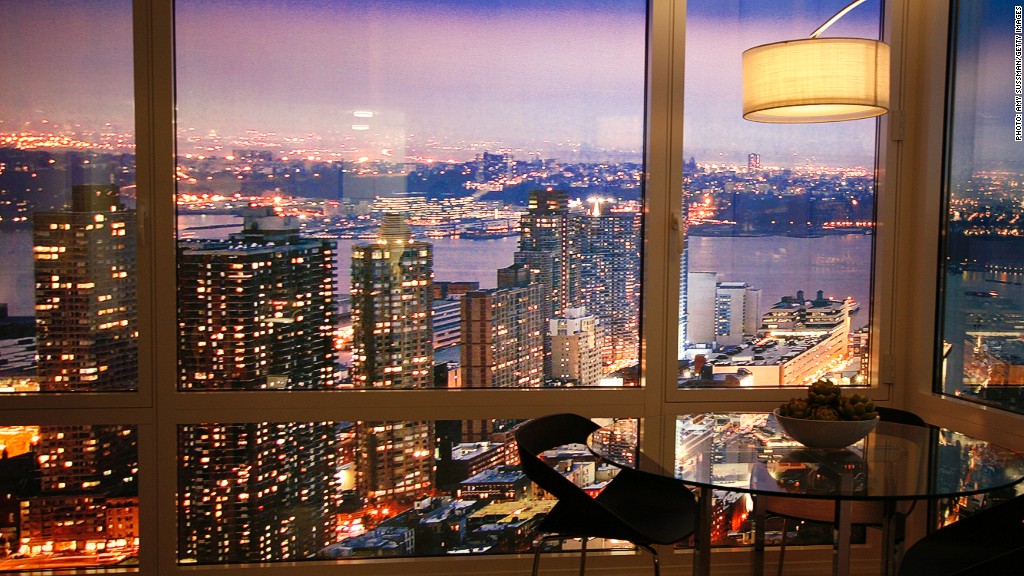
Watch out luxury homebuyers: Major cities across the globe are looking to wealthy real estate investors to boost their coffers.
Lawmakers in Paris, London and New York City are mulling new taxes on high-end home purchases, and the move has some experts worried that the luxury market will end up paying the price. High-end real estate has been a key player in housing's long recovery, and higher taxes could bring growth to a halt.
"For many, luxury homes are safety deposit boxes in the sky," said Jonathan Miller, president of residential real estate appraisal company Miller Samuel. "Any additional costs certainly reduces the attractiveness of the investment."
In New York, State Senator Brad Hoylman, (D-Manhattan), recently introduced a bill that would add a tax of up to 4% a year on properties in New York City with a current market value of more than $5 million. The tax would not apply to primary residences. New York already has a 1% mansion tax on home sales above $1 million. A study out of Columbia University earlier this year found that the mansion tax reduces real estate transactions around the million-dollar threshold.
"The wealthy who are not paying income tax should contribute to the city," Hoylman said. "Part of the reason they are investing here is that New York is stable, there's a rule of law here and security and there should be a premium paid for that, particularly from investors from countries like Russia and China."
Realtors say deals in Manhattan have slowed, despite the fact that the proposal is still in the very early stages. The bill has co-sponsors, including one in the state assembly, but hasn't been assigned to a committee.
"We saw several potential high-end sales go on hold over the tax," said Pam Liebman, president of the Corcoran Group. "Buyers need to know what their costs will be moving forward. No one likes buying in the dark."
Related: 5 luxury amenities rich homebuyers want
In London, lawmakers are floating an idea of an annual "mansion tax" on properties valued at £2 million (around $3.2 million) or more. France is reportedly considering adding a tax on second homes in certain parts of the country, including Paris.
While none of these taxes have actually been passed, the threat weighs heavy on luxury sales.
The mansion tax could negatively impact growth in the U.K.'s housing market by an average of five percentage points over the next five years, according to global real estate services provider Savills. If passed, the firm estimated the tax would result in average price falls of 5% across prime London next year, and 3.0% across the prime regions.
"Some [developers] will have to lower their prices, or the more likely option, offer significant concessions to remain competitive," said Miller.
Related: Mansions for under $1 million
Lawmakers have a long history of taxing non voters. Lodging and amusement taxes that disproportionately hit tourists are common. But that doesn't make it good tax policy, said Scott Drenkard, economist at the Tax Foundation.
"It's an easy way to export the tax burden to those who don't live in town and in state. Burdensome taxes could mean less sales, that's the risk you run."
He also worried that the discussed New York City tax could actually be unlawful. "It's an equal protection concern. If you have someone from out of town paying a higher rate for the same activity, that doesn't seem fair to me."
Related: For $65 million, you can buy Miami's most expensive home
In Manhattan, the question of who is -- or more importantly, who is not -- living in multi-million-dollar highrises has been gaining attention recently as many units are sold, but remain unoccupied. New Yorkers lose large chunks of their paycheck to taxes, something foreign buyers don't face.
Hoylman said there are blocks in his district where 50% of the properties aren't actively lived in. "That is a drag to the neighborhood."
At Corcoran, 30% of condo sales this year were to foreign buyers. But Liebman said dark units aren't necessarily a bad thing. "They are paying property taxes and don't use many of the services full-time residents use like schools and public transportation. When they are here, their significant spending fuels the growth of our local economy. "

